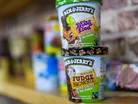Unilever to Sell off Ice Cream, With Loss of 7.5K Jobs

Unilever has announced plans to sell off its successful Ice Cream business in a bid to “refocus” its operations.
The company says it is “focused on a portfolio of superior brands with strong positions in highly attractive categories that have complementary operating models”.
Ice Cream, it says, has “a very different operating model”, and that its sale “best serves the future growth of both Ice Cream and Unilever”.
In 2023 Unilever’s ice cream brands – which include Wall’s, Magnum and Ben & Jerry’s – delivered a turnover of €7.9bn (US$9.8bn).
In all, Ice Cream has five of the top 10 selling global ice cream brands.
Work on selling off Ice Cream is already underway, with full separation expected by the end of 2025, the company says.
Unilever revealed that the proposed changes will impact around 7,500 roles globally, with most of these being office-based. In all, total restructuring costs are expected to be around 1.2% of Group turnover for the next three years.
Unilever simplifies operations across four business groups
The move is part of Unilever's Growth Action Plan (GAP), which will see it rationalise operations across four business groups:
- Beauty & Wellbeing
- Personal Care
- Home Care
- Nutrition
These have “complementary routes to market, R&D, manufacturing and distribution systems” says the company.
Unilever announced GAP in October 2023, explaining it was focused on “doing fewer things, better, with greater impact to drive consistent and stronger topline growth, enhance productivity and simplicity, and step up Unilever’s performance culture”.
In a statement, the company said: “The Unilever Board is confident that the future growth potential of Ice Cream will be better delivered under a different ownership structure."
Unilever says Ice Cream “has distinct characteristics compared with our other operating businesses”, including its supply chain and point of sale, which support frozen goods, a different channel landscape, more seasonality and greater capital intensity.
It added that, under new leadership, Ice Cream is making “significant operational changes at pace that are expected to drive stronger performance”.
These, it says, include improved productivity and efficiencies, product rationalisation, and investment behind significant innovations.
Unilever added that, as a standalone business, Ice Cream’s management team “will have operational and financial flexibility to grow its business, allocate capital and resources in support of the company’s distinct strategy”.
It said this included optimising its manufacturing and logistics network, and developing flexible distribution channels.
It said the division could be ‘demerged’, but added that other options for separation “will be considered to maximise returns for shareholders”.
Hein Schumacher, CEO of Unilever, said: “Simplifying our portfolio and driving greater productivity will allow us to further unlock the potential of this business, supporting our ambition to position Unilever as a world-leading consumer goods company delivering strong, sustainable growth and enhanced profitability."



